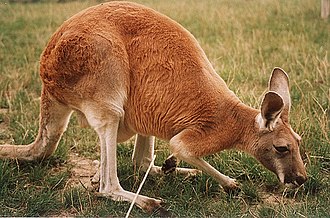Grazing (behaviour)


Grazing is a behavior exhibited by various herbivorous animals in which they feed on plants, such as grasses, herbs, and other low-lying vegetation. This behavior is a critical component of many ecosystems, influencing both the structure and function of environments across the globe. Grazing can be observed in a wide range of animals including, but not limited to, cattle, sheep, goats, horses, and various wildlife species such as deer, antelope, and elephants.
Types of Grazing[edit]
Grazing behavior can be classified into several types, each with distinct impacts on the environment and the grazers themselves.
Continuous Grazing[edit]
Continuous grazing occurs when animals have unrestricted access to a grazing area throughout the year or for extended periods. This method can lead to overgrazing, soil compaction, and reduced plant diversity if not properly managed.
Rotational Grazing[edit]
Rotational grazing involves dividing the grazing area into smaller sections, called paddocks, and moving the animals between these paddocks in a planned sequence. This allows vegetation in rested paddocks to recover, promoting plant diversity and soil health.
Selective Grazing[edit]
Selective grazing refers to the preference of certain plant species or parts by grazers. This behavior can alter plant community composition and biodiversity over time.
Impact on Ecosystems[edit]
Grazing has both positive and negative impacts on ecosystems. Properly managed grazing can mimic natural processes, promoting plant diversity, controlling invasive species, and enhancing wildlife habitat. However, excessive grazing can lead to soil erosion, loss of plant diversity, and desertification.
Positive Impacts[edit]
- Soil aeration and nutrient cycling through animal movements and waste deposition.
- Control of invasive species by preferentially grazing on them.
- Promotion of plant diversity by preventing any single species from dominating.
Negative Impacts[edit]
- Soil compaction, reducing water infiltration and aeration.
- Overgrazing, leading to reduced plant cover and increased erosion.
- Loss of biodiversity due to selective feeding on certain species.
Grazing Management[edit]
Effective grazing management is essential to balance the needs of the grazers with the conservation of plant communities and soil health. Strategies include implementing rotational grazing, setting appropriate stocking rates, and restoring degraded areas.
Conclusion[edit]
Grazing is a complex behavior with significant ecological implications. Through understanding and implementing sustainable grazing practices, it is possible to harness the benefits of grazing while mitigating its negative impacts, ensuring the health and productivity of ecosystems for future generations.
Ad. Transform your life with W8MD's Budget GLP-1 injections from $49.99


W8MD offers a medical weight loss program to lose weight in Philadelphia. Our physician-supervised medical weight loss provides:
- Weight loss injections in NYC (generic and brand names):
- Zepbound / Mounjaro, Wegovy / Ozempic, Saxenda
- Most insurances accepted or discounted self-pay rates. We will obtain insurance prior authorizations if needed.
- Generic GLP1 weight loss injections from $49.99 for the starting dose of Semaglutide and $65.00 for Tirzepatide.
- Also offer prescription weight loss medications including Phentermine, Qsymia, Diethylpropion, Contrave etc.
NYC weight loss doctor appointmentsNYC weight loss doctor appointments
Start your NYC weight loss journey today at our NYC medical weight loss and Philadelphia medical weight loss clinics.
- Call 718-946-5500 to lose weight in NYC or for medical weight loss in Philadelphia 215-676-2334.
- Tags:NYC medical weight loss, Philadelphia lose weight Zepbound NYC, Budget GLP1 weight loss injections, Wegovy Philadelphia, Wegovy NYC, Philadelphia medical weight loss, Brookly weight loss and Wegovy NYC
![]() Error creating thumbnail:
Error creating thumbnail: ![]() Error creating thumbnail:
Error creating thumbnail:
|
WikiMD's Wellness Encyclopedia |
| Let Food Be Thy Medicine Medicine Thy Food - Hippocrates |
Medical Disclaimer: WikiMD is not a substitute for professional medical advice. The information on WikiMD is provided as an information resource only, may be incorrect, outdated or misleading, and is not to be used or relied on for any diagnostic or treatment purposes. Please consult your health care provider before making any healthcare decisions or for guidance about a specific medical condition. WikiMD expressly disclaims responsibility, and shall have no liability, for any damages, loss, injury, or liability whatsoever suffered as a result of your reliance on the information contained in this site. By visiting this site you agree to the foregoing terms and conditions, which may from time to time be changed or supplemented by WikiMD. If you do not agree to the foregoing terms and conditions, you should not enter or use this site. See full disclaimer.
Credits:Most images are courtesy of Wikimedia commons, and templates, categories Wikipedia, licensed under CC BY SA or similar.
Translate this page: - East Asian
中文,
日本,
한국어,
South Asian
हिन्दी,
தமிழ்,
తెలుగు,
Urdu,
ಕನ್ನಡ,
Southeast Asian
Indonesian,
Vietnamese,
Thai,
မြန်မာဘာသာ,
বাংলা
European
español,
Deutsch,
français,
Greek,
português do Brasil,
polski,
română,
русский,
Nederlands,
norsk,
svenska,
suomi,
Italian
Middle Eastern & African
عربى,
Turkish,
Persian,
Hebrew,
Afrikaans,
isiZulu,
Kiswahili,
Other
Bulgarian,
Hungarian,
Czech,
Swedish,
മലയാളം,
मराठी,
ਪੰਜਾਬੀ,
ગુજરાતી,
Portuguese,
Ukrainian